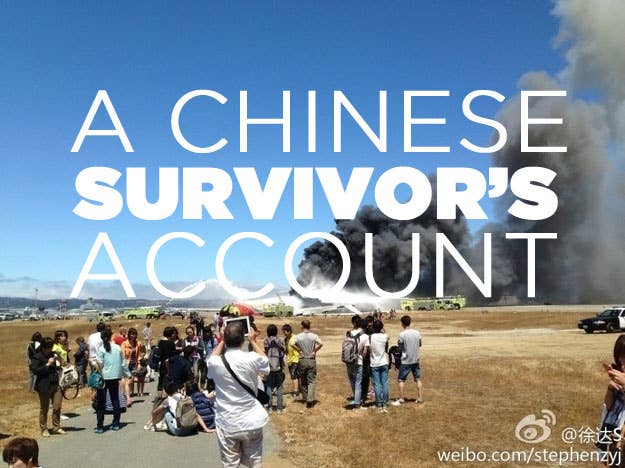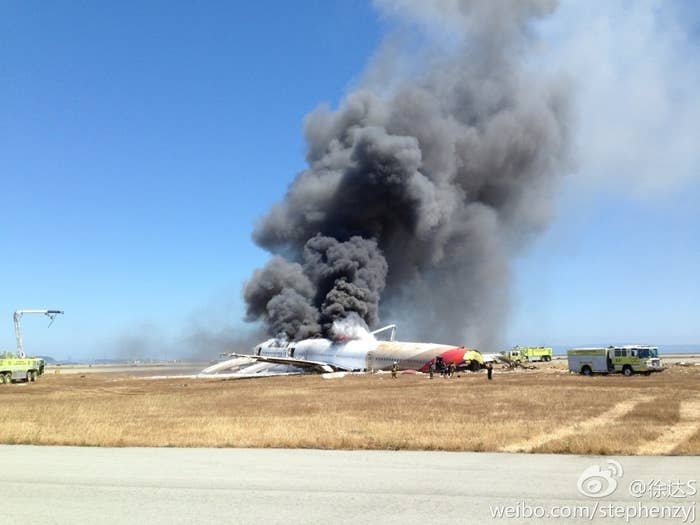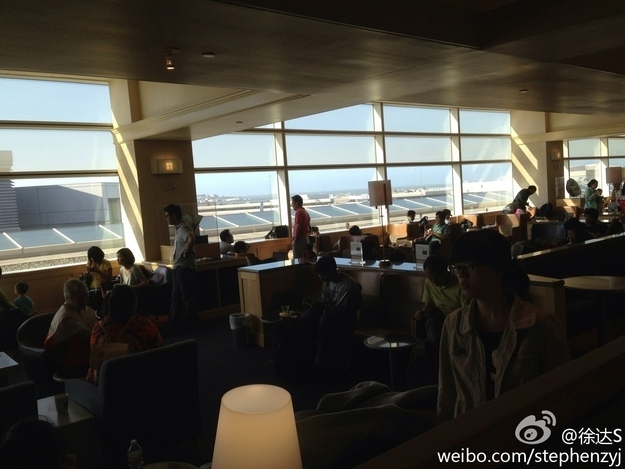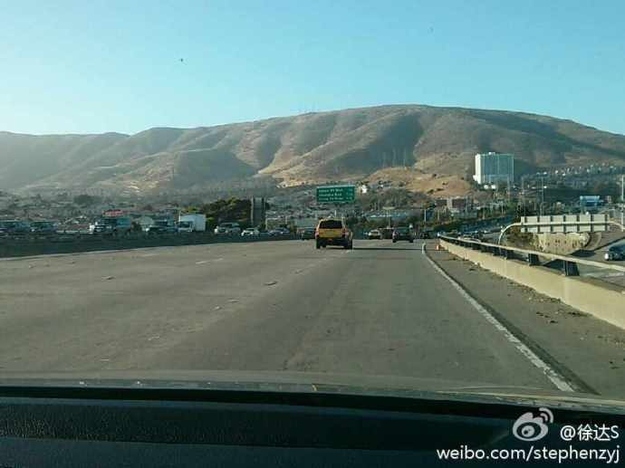
I flew on Asiana all the way from Shanghai to Incheon (in Korea), then from Incheon to San Francisco. Besides the final disaster, the flight was good. Best service, food, and sanitary conditions I've seen on any flight. Sure, there was an hour's flight delay, and I rushed to make my connection. Some ask why I chose an Asiana flight with a transfer. The reason's simple: it was ranked a best airline of 2012, and the timing and price were right.
In the last hour before landing, the plane hovering 1000m above the sea, I was sleeping. Movies were closing on the backseat TVs, to show the height, hour, distance, and speed of our flight; someone asked me if I could read Korean. I couldn't, but it cycled to an English menu. San Francisco was lidded in low clouds below us, mist hugging its peaks. I pointed to the mountains, lakes and buildings for my son, who sat near the window. He said the cars on the highways looked like ants.
We sat on fourth to last row in Economy Class. Behind us were the bathrooms and kitchen. I remember few seats were available for choosing online, and only the seats at the tail end were empty. We choose the frontmost seats we could, my son on my right and my wife on my left.
My son asked me questions about the scenes outside, and I answered them. As the plane dipped towards the runway, the cabins quieted down, shuddering only occasionally. But as we neared the shore, I felt the plane jerk towards the earth, as if pressed down by air currents. Then we saw the runway's embankments and I knew something was wrong. The banks were very tall. We were hugging too close to water.
I heard the engines roar. In my experience, engines don't start before landing, except when it's trying to pull into air. But we were about level to the embankments, too low to the ground for that. I subconsciously braced my left arm against the seat before me, something I learned from the 40 yearly business flights I took in 1999 and 2011. As I prayed, I heard an explosion behind me. Then a loud sound tore through the cabin, and I felt the hull drag across the tarmac slantingly. Dust sprayed into and around the cabin. I forgot what position my body took. I just knew we should stay put til the plane stopped moving. My chin stabbed into my chest, and to this day there is still a raw spot there, and my neck is still cramped. My head slammed into the table tray in front of me. As the hull slid, I smelled the sharp stink of metal burning from friction. I feared that the belly of the hull touched ground. Oxygen masks dropped before us, and sparks flew in the front cabin. We just had to hold on tight, I thought, and wait for it to stop, and if it stopped we'd survive.
People screamed, but the plane soon stopped. There was dust in the cabins, and the rows before us were completely dark. Oxygen masks dangled, but the overhead bins stayed shut. My wife heard my son call "dad! dad!" and thought I had been hurt, but when our eyes met, we knew we were fine. People began to stand up in the cabin, opening overhead bins. My wife gathered our bags, I stuffed things in my backpack in a hurry, and we wondered if we would be stuck in the last rows for a long time. My son already scouted out the aisles and said we could leave from the back. I turned around to see sunlight -- the last rows behind us and the kitchen compartment were totally gone, with just the divider board standing, and a yellow cloth draped across it like a long flag. My son ran through the hole, and my wife and I followed. I didn't instruct everyone to drop their luggage and leave with us, nor did I set a good example, which is a weak showing in a moment of crisis, and I'm here to accept everyone's criticism.
There was a man holding a child in front of us. We didn't have to kneel down to escape from the hole, and the hole wasn't far off the ground. We stepped on some boards and ramps strewn about and left the plane, passing some cars. When we passed the plane's kitchen cabin, we didn't see flight attendants and thought that was weird, and my wife noted that the last two seats had sunk really low to her waist level. She didn't know if anyone sat there, but we now know those two seats suffered the greatest impact.

We ran 100 meters, where some people were huddled, and some officer said "calm down, sit here." My wife and son noticed my elbow was bleeding a little, not a whole lot. Behind us, people were crawling out of the plane's tail. Two black cars flanked the hull, spraying some foam at it. Wisps of smoke escaped the plane's top, and the firemen soon covered that too. We admired how quickly the airport reacted to this accident, and I felt liked we were reborn. From the Weibo photos I took, you can see the inflatable slides at the planes front, and injured and bloodied victims gradually getting rescued. We thought the plane's tail took the most damage, and we were fine, so why would others be injured? The smoke thickened from the plane. Some were lying in great pain. Some walked by with their heads wet with foam. Once we had most of everyone, we were instructed to move to another clearing.
Cars were waiting for us. As we walked, we saw that fire was sprouting from the plane. What luck, I thought, that it caught fire slowly. Otherwise we'd all be in trouble.
People asked us if we were hurt. I rolled up my pants to find that a large patch of skin had been rubbed off my leg, blood seeping through fabric, but it wasn't too bad. There was a two inch hole in my inner wrist, too. My wife's leg had 3 holes forming a gash 3 inches wide, which bled considerably, but dust caked over the holes and stopped it. Medics came and gave us paper placards to rate our own pain levels. We we told to wear the placards that described our injuries and wear them on our necks. We hung the "minor injury" placard, and when medics asked if we need hospitalization, we thought we'd save them the bother. We didn't think of how we might ask the airline for compensation.
We sorted ourselves between minorly injured to heavily injured and waited for the bus, standing across the runway from the plane. Those around me mostly had minor injuries. The badly hurt ones were hoisted on gurneys and pulled away. Then we sat on the floor, wondering what would happen next. Thirty minutes later, the bus came. Medics want the mildly injured to board first, so we waited. By this point, the plane stopped burning. It was two or three PM in San Francisco, we're not sure, but it was too late in China to call our family, so we just checked into Weibo to tell our friends we're fine.

As we settled in, I noticed that my son hadn't spoken since the crash. I asked him why, and he began to cry. "Dad, let's never ride a plane again." My heart broke for him. I wanted him to see other worlds on this vacation, to see his aunt's family, and play with the cousins he grew up swimming and playing the piano with. I brought books for him to read over the summer, so he could continue growing and learning, but now it was all dust in the luggage. What should I do now? My wife and I kept trying to calm him.
"Don't worry, we're all fine. We have to keep moving til you join your cousin Jason."
"This isn't so bad. Your dad was in a train wreck in college, right in the compartment of a burning fuel tank. Now that was bad. Everyone dropped their things and jumped out the windows. We're all very lucky today."
Thanks for the One Child policy, I only have this child, and he's my everything. In the bathroom, I washed the dirt and dust from his hair, all torn up inside. My wife kept talking to him, trying to calm him down.
Around 6 PM, we were told to line up elsewhere. We all moved to United Airlines' VIP lounge, a better waiting room where snacks and drinks were on offer. But we still couldn't leave. We finally got to eat. My son felt better.

